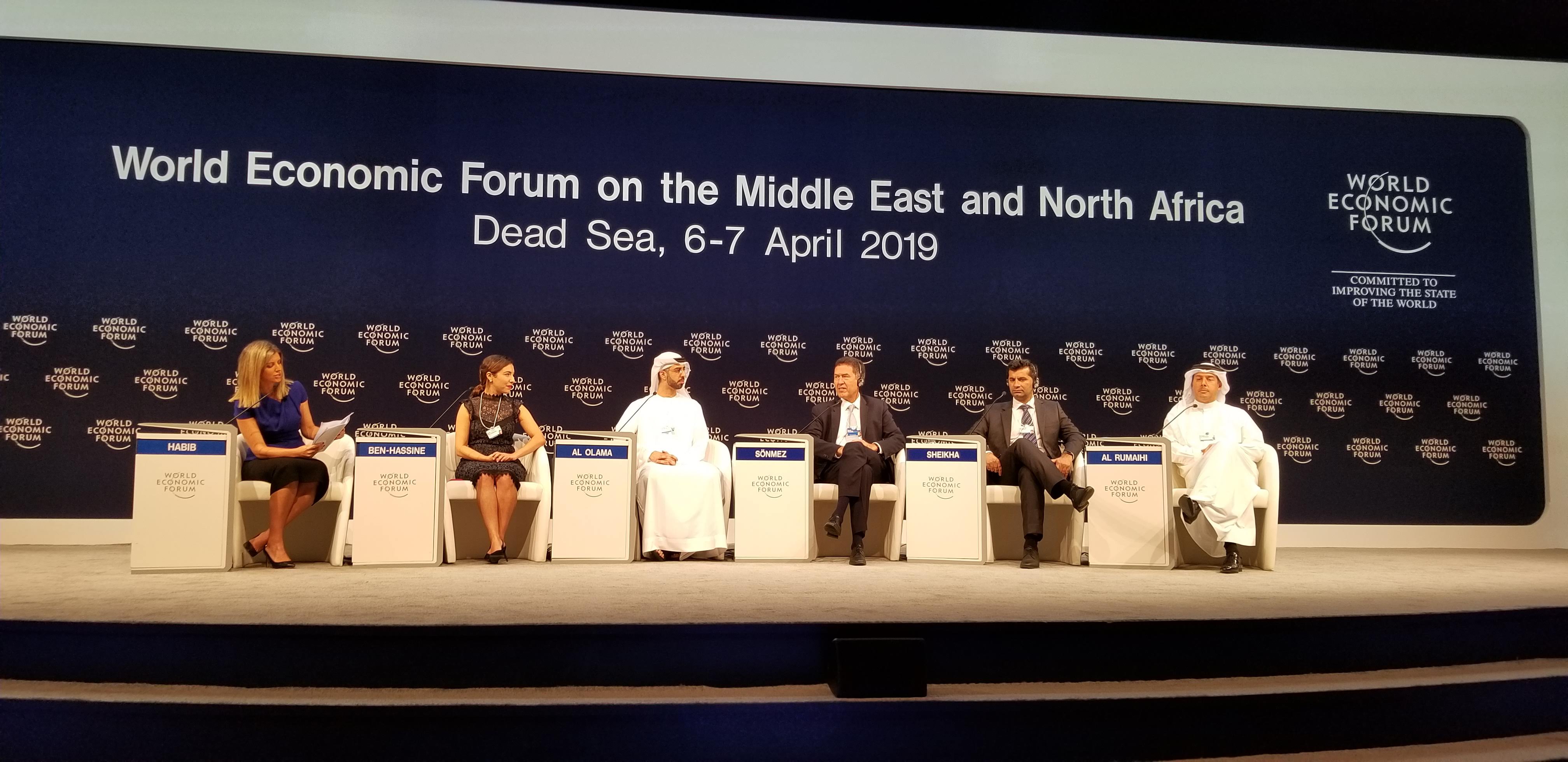More than Money: Deregulation and User Protection Needed to Create Competitive Arab Tech Scene

The entire video of the conference on the 4th Industrial Revolution in the Arab World at this link.
By Georg Schmitt, Head of Corporate Affairs, Public Engagement, Email: georg.schmitt@weforum.org
· Middle East and North Africa boasts a growing number of start-ups, with a 31% increase in investments to $900 million in 2018
· For governments and companies alike, the new digital economy will bring pluses and minuses, especially when it comes to employment prospects
· World Economic Forum on the Middle East and North Africa, taking place in Jordan on 6-7 April, brings together more than 1,000 leaders of government, business, civil society, faith and academia
· Find more information about the World Economic Forum and follow the meeting
Dead Sea, Jordan, 7 April 2019 – The Arab world needs to fast-track balanced regulation that supports the opportunities created by the Fourth Industrial Revolution while protecting data privacy, if it is to capitalize on the region’s emerging technology scene.
The Middle East and North Africa boasts a growing number of start-ups, with a 31% increase in investments to $900 million in 2018 compared to 2017 across sectors including transport, healthcare and fintech. Such businesses offer the potential for a new wave of economic growth in a part of the world traditionally handicapped by weak infrastructure and a limited industrial base.
“I view the Fourth Industrial Revolution as our opportunity to catch up, as our opportunity to leapfrog and actually get to parity with the rest of the world,” said Mudassir Sheikha, Co-Founder and Chief Executive Officer of ride-hailing firm Careem.
Careem has emerged as a poster-child for the Arab digital economy after it was acquired last month by Uber for $3.1 billion – a milestone for Arab tech deal-making. It comes on the heels of the $580 million purchase of Dubai-based e-commerce company Souq by Amazon in 2017.
After steam, mass production and information technology, the Fourth Industrial Revolution is bringing accelerating cycles of innovation, driven by artificial intelligence, robotics and biotechnology. It offers the promise of new high-tech jobs in a region struggling with high levels of youth unemployment – provided countries can deliver the right educational foundations.
But the rapid pace of change also raises concerns at a time when digital giants such as Facebook are confronted by a growing “techlash” over data privacy. Regional sensitivities over cultural norms add an extra level of complexity.
“It’s a very nuanced situation,” said Wafa Ben-Hassine, Counsel, Middle East and North Africa (MENA) Policy at Access Now, who argues that governments in the region must adopt a user-centred framework to ensure privacy and freedom from surveillance and censorship.
Some countries are already moving to embrace the new technological future, with Bahrain – recently selected as the site of new Amazon data centres – having passed a law allowing data stored there by foreign companies to be governed by laws of their home country.
“We think that is going to be a ground-breaking law,” said Khalid Al Rumaihi, Chief Executive, Bahrain Economic Development Board. “We, of course, have to manage risk but we have to not ignore opportunity.”
The United Arab Emirates, meanwhile, has appointed Omar bin Sultan Al Olama as the world’s first Minister of State for Artificial Intelligence, underscoring the Gulf state’s determination to carve out a niche in the new digital world.
“Not one country is going to lead in the Fourth Industrial Revolution,” Al Olama said. “There are going to be hubs of excellence across the world and each hub is going to champion one or two domains – and we want to champion the domain of government, first and foremost.”
For governments and companies alike, the new digital economy will bring pluses and minuses, especially when it comes to employment prospects – a dilemma showcased vividly by Careem, which has created 1 million jobs since it started operating seven years ago, but could also destroy employment with the arrival of autonomous cars.
In practice, Sheikha said, the impact of self-driving cars will be felt more gradually in the Middle East thanks to cheaper labour costs, with driver costs accounting for an average 25% of trip expenses in the region against 80% in the United States.
In region known for its big governments, it is important that regulations do not create stumbling-blocks to optimizing the benefits of technology, according to Murat Sönmez, Managing Director and Head of the Centre for the Fourth Industrial Revolution Global Network, World Economic Forum. “We need to make sure we don’t get in the way of the potential.”
And Klaus Schwab, Founder and Executive Chairman, World Economic Forum, warned that the Middle East simply cannot afford to be left behind. “Those countries that absorb the potential of the Fourth Industrial Revolution first will be the most competitive countries,” he said. “We have to make sure that countries and regions are not lagging behind.”
The World Economic Forum on the Middle East and North Africa is being held at the Dead Sea in Jordan on 6-7 April in partnership with the King Abdullah II Fund for Development (KAFD). The meeting marks the 10th hosted by Jordan since it was first convened at the Dead Sea in 2003. It is bringing together more than 1,000 government, business and civil society leaders from over 50 countries.
The Co-Chairs of this year’s meeting are: Khalid Al Rumaihi, Chief Executive, Bahrain Economic Development Board, Bahrain; Thani Ahmed Al Zeyoudi, Minister of Climate Change and Environment of the United Arab Emirates; Rania A. Al-Mashat, Minister of Tourism of Egypt; Alain Bejjani, Chief Executive Officer, Majid Al Futtaim Holding, United Arab Emirates; Wafa Ben-Hassine, MENA Policy Counsel, Access Now, USA; Sumantra Chakrabarti, President, European Bank for Reconstruction and Development (EBRD), London; Tony F. Chan, President, King Abdullah University of Science and Technology (KAUST), Saudi Arabia; and Sigrid Kaag, Minister for Foreign Trade and Development Cooperation of the Netherlands.

